During pre-season testing RaceFans interviewed several Formula 1 team principals about their plans and objectives for the year ahead.
The 2020 season promised to be a watershed moment for the sport: The end of Bernie Ecclestone era, as all the regulations, contracts and agreements inherited by Liberty Media, F1’s commercial rights holder since January 2017, were due to expire on December 31st.The global pandemic has eclipsed this, as with so many things. Inevitably, some of what was covered in those interviews is no longer relevant and ended up on the editing floor.
One interview which was published as F1 headed down under for its (aborted) season opener involved Haas team boss Guenther Steiner, the colourful and direct Italian whose business model disrupted the sport when Haas appeared in 2016.
The American entry classified eighth in its first championship after a consistent year, a position it repeated in year two. In 2018 the team owned by machine tool magnate Gene Haas rose to a sensational fifth. It harboured hopes of taking on the top teams the following season, but a combination of aerodynamic and associated tyre problems saw them slump to a disappointing ninth, as detailed in our previous interview.
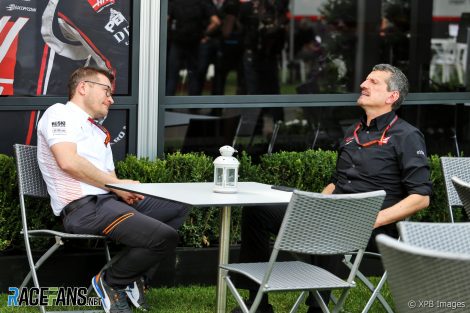
“I came back straight from Australia on Saturday,” he explains. “I’m back here since then trying to leave the house as little as possible.”
Unsurprisingly, arguably this most hyperactive of team bosses says he’s managing to keep “as busy as ever” despite the lockdown.
Advert | Become a RaceFans supporter and
“It’s just different challenges at the moment. It isn’t like you don’t have a target, [so] you go easy. I’ve got so much to do. There are a lot of big decisions in Formula 1, for the team, [and] I have my own company to run.” This is Fibreworks, a carbon fibre supplier to the local motorsport industry.
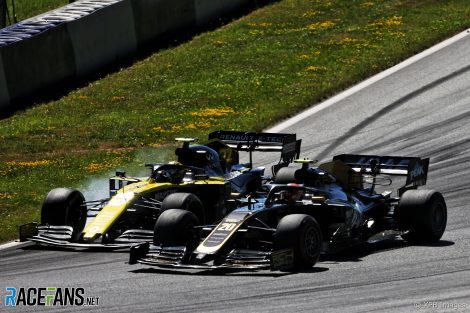
With research and development, design and production undertaken at Ferrari and Dallara in Italy, a team base situated in the British midlands (Banbury) and support functions operating out of the Haas race headquarters – its teams are active in NASCAR and off-road competition in the USA – in Kannapolis (near Charlotte), Steiner embraced ‘distance working’ long before it became vogue in F1. Has that made it easier to cope with the challenges presented by the pandemic?
“For me not a lot changed. For example the meetings with the people in the UK or Italy, where 95% of them are in any case, it’s a matter of ‘Just give me an address or send me an invitation and I’ll be there’.
“I think the world will learn a lot out of this, that maybe we don’t need to do all this travel. Look at how we’re speaking, I mean, the quality. We can’t shake our hands, but we shouldn’t be doing that anyway [at] this time.”
It’s something F1 could benefit from in future, he points out. “It costs less because we don’t need to travel, and it’s less tiring because you don’t sit down in an aeroplane.”
But there is a more important lesson F1 must learn from the current situation, he adds.
Advert | Become a RaceFans supporter and
“Not everything is always going up. Sometimes you go down as well and you need to be ready. I think we were not prepared for this because normally you have a crisis plan about what you will be doing, but now we are still negotiating our crisis plan between the 10 [teams].

He is full flight, so I let him continue: “You know, nobody predicted this one. Everybody was afraid of a financial crisis coming, and all of a sudden we have a pandemic which ends up to be a financial crisis as well. Nobody predicted this. We just need to be a little bit more careful, not [be] scared of [it], but be better prepared for anything that could cross the road.
But could F1 realistically have planned for a pandemic hitting the sport, particularly when the entire world was arguably caught napping?
“You cannot put a specific plan in place, in my opinion. But what we should plan is not to run always at 100%, to squeeze whatever we can get out of it, because then you have nothing left. You should make sure that you’ve got a buffer [in case] something like this happens.
“Like in every company, you [need] some money back in the bank, then if something goes wrong, you know that you can survive for a period of time. We have never even thought there could be a crisis. If you get a crisis, [we thought] we just deal with it. But it’s not easy, and a lot of people are working hard to make it happen.”
Despite tales of dissent between teams, he is bullish: “A lot of people which came out pretty strong are trying to help this, you know within the teams, and being creative and positive.
“Not everybody has understood yet that we are in a crisis, but a lot of people are very, very supportive, very creative [so] that we can survive. All of us, not only a few of us.
Go ad-free for just £1 per month
>> Find out more and sign up
I wonder whether this is an oblique reference to Ferrari’s stance on budgets, and decide to pursue this point separately – see below. However, back to his point about maintaining a crisis reserve: would doing so not go against the very essence of F1, which is being on the absolute limit at all times?
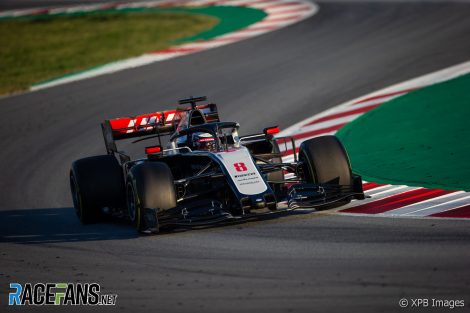
Given the aforementioned comments, what is Guenther’s take on the team principal teleconferences, called on a regular basis so that the FIA, F1 and teams can face the sport’s various challenges head-on?
“There’s a lot more understanding of each other,” he says. “It is not unanimous – yet – that we are all agreeing on the same things. There are different things [we disagree on]. You also need to consider that our business models are quite different, so if it would be unanimous, something would be wrong.
“We just need to be unanimous to find a compromise. We have to respect each other. But we are getting close and hopefully in the next week, we can be can make a step to be done with our discussions in the moment.
Obviously, all teams have different wish lists; what would he prefer to see as end result?
“If you want a [simple answer]: that everybody can be competitive. Even on the [prize] money, the money needs to be very similar in order for us to be competitive. So, it should be a budget cup everybody can live within: The big teams can live within it; the small teams can live within it.
“But the biggest thing [that] for me that needs to come out, is we need to be competitive. Being competitive doesn’t mean that all of sudden Haas wants to win races. Yes we want to win races, obviously, but you have to be conscious about where we are.
“We want to be in a position – in a realistic position – where in a few years we can be on the podium. And then if we do a good job we get more [prize] money, and we can get the higher budget. Then we can win races. There needs to be an honest possibility to achieve that. That is for me what I would like to see coming out of this.”
During testing I spoke briefly with Gene Haas, who said he came into F1 in the belief that the team had a chance of winning, but soon realised there no chance due to the sport’s financial and organisational structures. Based on Gene’s comments, I ask Guenther whether F1 could (again) be a sport in which every entrant has a chance of winning provided they do most things right.
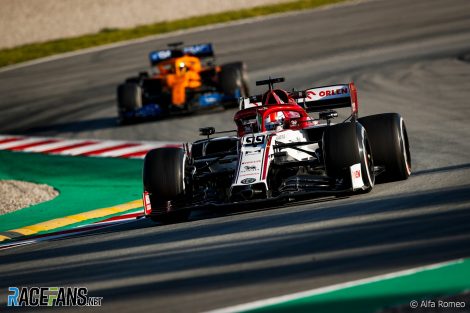
“Works teams like McLaren and Renault cannot beat them, so what chance do we smaller ones have? But with a budget cap I think we have at least a chance to bring the field closer together, and then if you do a good job, you will be rewarded. That maybe pushes you up the next step, and then maybe you can actually win.
“But, in the moment, it’s just not [possible]. Or you inject billions. I’m not talking millions. Billions.”
Which leads neatly to the next question: Given that budget caps seem to be the thorniest topics during team boss calls, at what level would he like to see budget caps set? Already Haas operates one of the lowest budgets and certainly the lowest headcount due to its unique ‘buy-in’ model.
At first he refuses to be drawn, saying the teams were about $10m apart after the last call, but I point to numbers of between $100m and $150m being bandied about.
“The truth is somewhere in the middle,” he admits, “because I think $100m is very difficult for big teams, and we need to be respectful about what they’re doing.“The FIA and the president of the FIA (Jean Todt) have a good understanding of where the budget cap needs to be, to suit everybody. Their decision will be based on facts, not on politicking and biased opinions. I think we’re getting there, but we’re not there yet, so I don’t want to sing ‘glory’ too early.”
One of the accusations often levelled at Haas by its detractors is that is effectively a political slave of Ferrari, in lockstep with Maranello due to its dependence on the Italian team for technical support and services. Yet the two are clearly at odds over budget caps. How difficult is it to maintain cordial relations under such circumstances?
“Our respect for each other Ferrari, Haas it’s still there, for sure. We have got discussions about it, obviously, but we never were a slave to Ferrari. We always worked together in a respectful way. Without them wouldn’t be here, and I would never deny that one. I said it in public more than one time that without their help we would not be here.
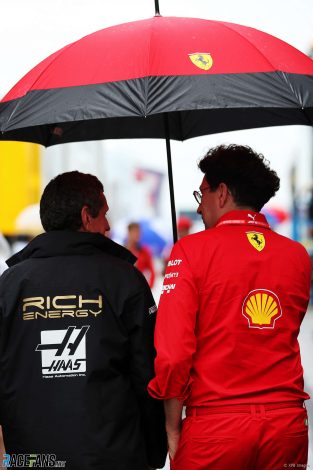
“By saying that I don’t disrespect them, because I respect them a lot. So, it’s one of these things in this relationship that sometimes you need to agree to disagree, and just move on. We don’t decide. They don’t decide; we ten teams decide [the way forward].”
Would he describe the relationship between his country’s iconic team and that of the team he founded in his adopted homeland as purely commercial, and not politico-commercial?
“I mean,” he laughs, “it’s political when it suits both of us. It’s business but it’s not opportunistic, it’s somewhere in between. It doesn’t need to be always one or the other. There can be something in between, you know.
“It’s like if you agree on something we fight together; if we disagree on it, we don’t fight each other, but tell each other what we think about that. But, there’s no disrespect in it, and whenever I go against Ferrari there’s no disrespect.
“My biggest interest is to protect Haas, and the second one is [to protect] everything that comes after [that].”
RaceFans will publish an extended video interview with Guenther Steiner later this week. Subscribe to our YouTube account to make sure you don’t miss it.
RacingLines
- The year of sprints, ‘the show’ – and rising stock: A political review of the 2021 F1 season
- The problems of perception the FIA must address after the Abu Dhabi row
- Why the budget cap could be F1’s next battleground between Mercedes and Red Bull
- Todt defied expectations as president – now he plans to “disappear” from FIA
- Sir Frank Williams: A personal appreciation of a true racer




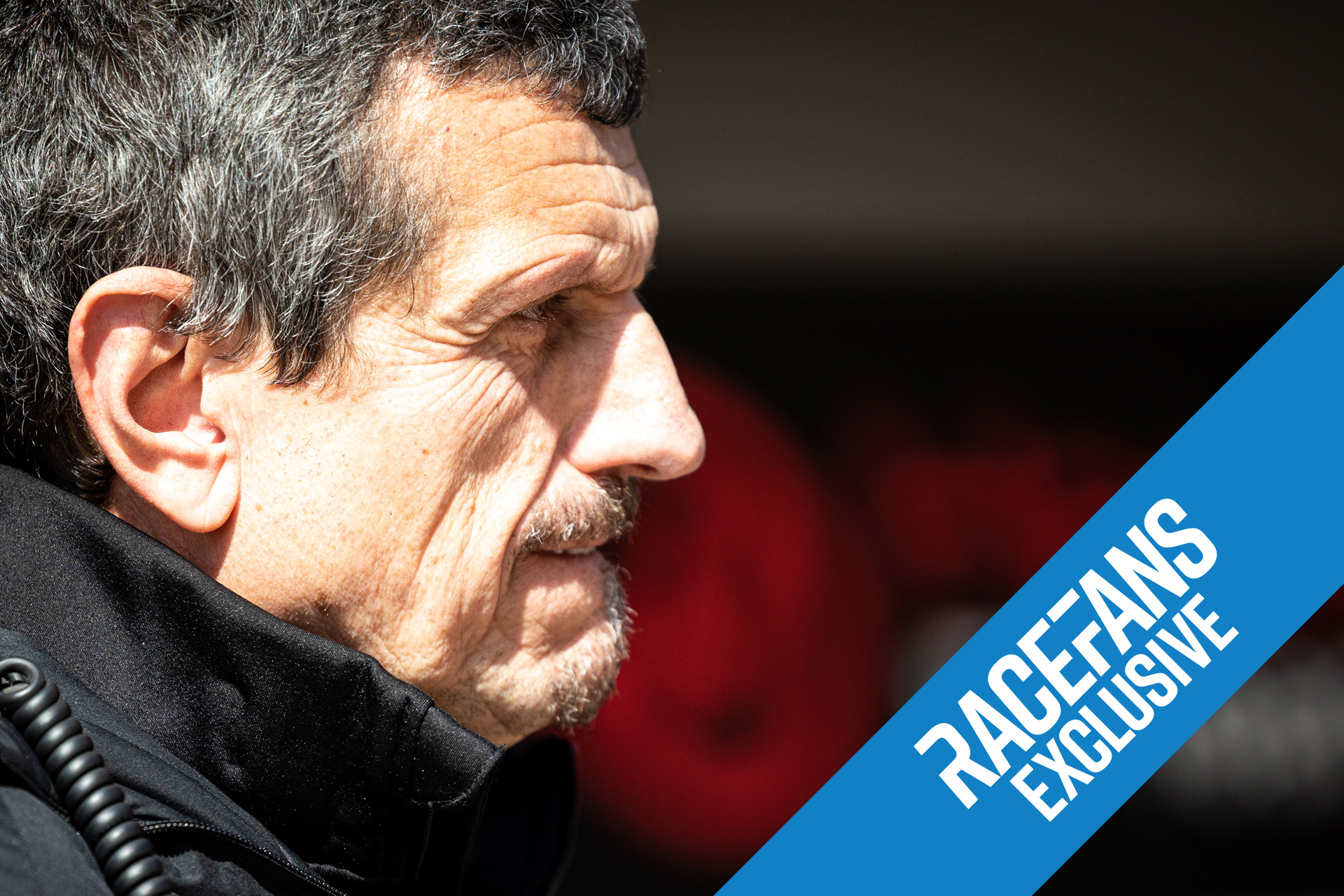

BasCB (@bascb)
29th April 2020, 12:14
Thanks for another really worthwile read! Keep them coming.
I don’t see anything in what Steiner brings up that does not sound reasonable.
Aleš Norský (@gpfacts)
29th April 2020, 13:17
Winning in Formula 1 is extremely hard and always has been. The small and/or non-constructor teams have won only handful of those 1000+ world championship races. There are 16 GP wins shared between Rob Walker, Jordan, FISA, AAR, Hesketh and Toro Rosso…the latter arguably being the last smaller outfit to win a single race 12 years ago.
socksolid (@socksolid)
29th April 2020, 17:16
It has been hard but never impossible. After the hybrid era began there has been 3 teams who can win. Nobody else can win. Just 2 years earlier before the hybrid era we had a season with 6 teams winning at least one race. Sure it is an outlier of a season but winning in f1 has always been really hard. But possible. But nowadays it is impossible unless you are one of the big three. It is easier to win before 2014 than it is to get a podium after.
anon
29th April 2020, 18:35
@socksolid when you say it was “an outlier of a season”, that is a bit of an understatement – the opening races of the 2012 season was the most statistically abnormal season that the sport has ever seen in terms of different manufacturers winning races, and in terms of how random the distribution of performance was over the breadth of the entire field in general.
It is also a little misleading, since there was a marked reduction in randomness over the season – outside of those first five races, all but one of the successive fifteen races were then won by the same three teams. That extreme randomness basically only came about because nobody could work out how Pirelli’s tyres worked in those opening races, and we can all remember that it caused a significant backlash amongst the fan base because people complained that it too random and seemed to be devaluing driver skill, as drivers admitted that it was basically blind luck whether or not their tyres might actually be in the right operating window for that race.
Biskit Boy (@sean-p-newmanlive-co-uk)
30th April 2020, 8:22
Well whichever way you look at it F1 is in a pathetic state in terms of sport and competition. One line in Gunther’s comments stuck out for me; “Gene Haas, who said he came into F1 in the belief that the team had a chance of winning, but soon realised there no chance due to the sport’s financial and organisational structures”. Enough said.
anon
30th April 2020, 12:46
@sean-p-newmanlive-co-uk to me, that says a fair bit about Haas perhaps having unrealistic ambitions to begin with as well.
If you look at his previous efforts, his NASCAR team performed fairly poorly until Tony Stewart became significantly involved in the operations of the team. Even then, wins have still been a fairly rare event for the team, even though they are one of the wealthier operations in NASCAR – team wealth still has a fairly significant impact in that series, despite ostensibly having cars that are meant to be identical in performance.
He couldn’t just walk into that series and start winning without a fairly significant amount of cash and time – why would F1 be different? You can raise criticisms of the difficulty of winning, but at the same time I think that Haas was coming into the sport with unrealistic expectations.
Biskit Boy (@sean-p-newmanlive-co-uk)
30th April 2020, 16:29
I don’t think the fact Haas misjudged his chances makes the slightest difference to the point I was making.
He said “no chance”, that isn’t sport.
Here it is simply put:
Its too expensive to be competitive in F1.
This devalues F1 in terms of diversity, richness and interest. If we had a grid of 30 cars, with perhaps 10-12 drivers with a car capable of winning wouldn’t that be way better than what we have now?
socksolid (@socksolid)
2nd May 2020, 4:17
No it wasn’t a total outlier. Here are stats of different winners every year in F1.
https://www.statsf1.com/en/statistiques/pilote/victoire/par-annee.aspx
The stats show clear trend that has never happened before. Same 3 have been the only ones to win for 7 year straight with winning being impossible for everybody else.
Phil Norman (@phil-f1-21)
29th April 2020, 14:13
An interesting read this.
I’m guessing of course but I am going for a budget cap of $135 million being agreed. Any thoughts?
stefano (@alfa145)
29th April 2020, 15:50
Guenter Steiner is italian? I highly doubt this, but can’t be bothered to check
GnosticBrian (@gnosticbrian)
29th April 2020, 17:21
“…can’t be bothered to check” – so why waste our time posting and why mispell Günther?
Steiner was born 7 April 1965 in Merano, South Tyrol. South Tyrol is an autonomous province in northern Italy.
melanos
29th April 2020, 18:44
ue is a (mostly) accepted alternate spelling of the umlaut, whisch is unavailable in many keyboards
Invisiblekid (@invisiblekid)
29th April 2020, 23:08
Works fine with copy/paste, but since stefano can’t be bothered to check and instead assume Dieter Rencken is an idiot, he wouldn’t know this.
Dieter Rencken (@dieterrencken)
30th April 2020, 6:13
The ‘ue’ spelling was adopted for obvious reasons after he moved to the US with Red Bull. I know, because as a German speaker I asked him about the change…
Invisiblekid (@invisiblekid)
29th April 2020, 23:05
It would take as much time and effort to check as it did typing your reply. We all make mistakes but I don’t think Dieter Rencken would make a mistake of knowing were an F1 boss hailed from.
Also, you clearly don’t have Netflix.
Nick Wyatt (@nickwyatt)
29th April 2020, 20:18
Reading this and other recent articles, there’s a question I’d like to ask @dieterrencken and anyone else who can help.
I know that the entry fee for F1 for a new team was $48m but is there an annual entry fee for existing teams? If there is, can I assume that all the teams have paid to enter a ‘World Championship’?
My question revolves around the validity of a World Championship this year. If it is not possible to stage sufficient races to qualify for a World Championship, would the entry fee have to be refunded to the teams?
bosyber (@bosyber)
30th April 2020, 8:38
There is an entry fee, but not to FOM but to the FIA, and it depends on how many points a team scored last season (so Mercedes pay the most, Williams the least this year) – somehow couldn’t find the racefans.net article on this, but autosport reported (end of last year):
But I don’t know the answer to your last question, the FIA regulations I can see do not consider that point.
Nick Wyatt (@nickwyatt)
30th April 2020, 11:25
@bosyber Thanks for the reply and valuable information.
@HoHum (@hohum)
29th April 2020, 22:18
Yes, well we all know where F1’s potential capital reserves went.
JC
30th April 2020, 0:49
Bernie has just become a dad again, so we know at least some of it is, err, “propping him up”…